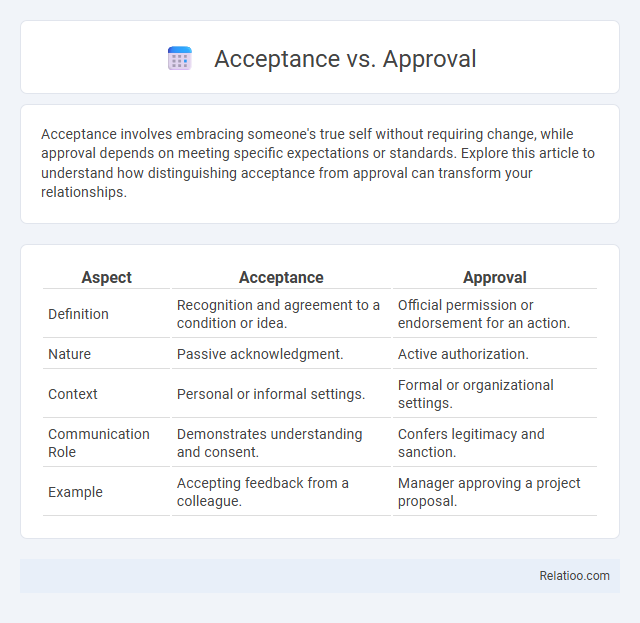Acceptance involves embracing someone's true self without requiring change, while approval depends on meeting specific expectations or standards. Explore this article to understand how distinguishing acceptance from approval can transform your relationships.
Table of Comparison
| Aspect | Acceptance | Approval |
|---|---|---|
| Definition | Recognition and agreement to a condition or idea. | Official permission or endorsement for an action. |
| Nature | Passive acknowledgment. | Active authorization. |
| Context | Personal or informal settings. | Formal or organizational settings. |
| Communication Role | Demonstrates understanding and consent. | Confers legitimacy and sanction. |
| Example | Accepting feedback from a colleague. | Manager approving a project proposal. |
Understanding Acceptance vs Approval
Understanding acceptance versus approval highlights key differences in emotional response and interpersonal dynamics. Acceptance involves recognizing and embracing someone's qualities or situations without judgment, while approval requires endorsing or agreeing with those qualities or choices. You can practice acceptance to foster empathy and inclusivity even when your personal approval isn't granted.
Defining Acceptance: What Does It Mean?
Acceptance means recognizing and embracing a situation or condition without resistance or judgment, reflecting a deep internal acknowledgment of reality. Unlike approval, which involves a positive endorsement or agreement, acceptance requires no consent or preference--it's simply an unreserved allowance of what is. Your ability to practice acceptance can lead to greater emotional resilience and peace, especially in challenging or uncontrollable circumstances.
What is Approval? Key Characteristics
Approval is the formal or official consent given after evaluating a proposal, idea, or request, often required to proceed with a specific action or decision. Key characteristics of approval include authority, formality, and validation, ensuring that the approved item meets predefined standards or criteria. Your understanding of approval is crucial for navigating organizational processes where permissions and endorsements are necessary for progress.
The Psychological Impact of Acceptance
Acceptance involves recognizing and embracing reality without judgment, which fosters emotional resilience and reduces stress. Approval requires external validation and often depends on others' opinions, potentially leading to anxiety and decreased self-worth when not received. The psychological impact of acceptance promotes inner peace and self-compassion, enabling individuals to experience a deeper sense of well-being despite external circumstances.
Social Dynamics: Why We Seek Approval
Approval influences social dynamics by validating Your identity and actions within a group, fostering belonging and self-esteem. Unlike acceptance, which involves embracing differences without judgment, approval requires meeting specific expectations or norms. Seeking approval drives behavior conformity but can limit genuine self-expression in social relationships.
Acceptance and Self-Worth
Acceptance involves recognizing and embracing your true self without judgment, which fosters genuine self-worth and inner peace. Approval often depends on external validation and can fluctuate based on others' opinions, whereas acceptance is an internal process that strengthens your resilience and confidence. Cultivating acceptance enhances your self-worth by allowing you to value yourself unconditionally, independent of external approval.
Approval and External Validation
Approval often involves seeking positive judgment or external validation from others, whereas acceptance is a personal acknowledgment of reality or circumstances without requiring external consent. Your self-worth should not depend solely on approval, as external validation can fluctuate and be influenced by others' opinions. Embracing acceptance fosters inner peace and resilience, contrasting with approval's dependency on external affirmation.
Differences Between Acceptance and Approval
Acceptance involves recognizing and allowing a situation or idea without necessarily agreeing with it, while approval means expressing a positive judgment or endorsement of it. You can accept someone's behavior or opinion without approving of it, which highlights the key difference in emotional or evaluative engagement. Understanding this distinction helps in navigating interpersonal relationships and decision-making processes effectively.
How to Cultivate Acceptance Over Approval
Cultivating acceptance over approval involves embracing self-awareness and recognizing internal validation as more sustainable than external praise. Practicing mindfulness and self-compassion strengthens emotional resilience, enabling individuals to acknowledge their imperfections without seeking others' approval. Setting boundaries and focusing on personal growth fosters a mindset where acceptance becomes a foundation for authentic confidence and well-being.
Conclusion: Choosing Acceptance or Approval
Choosing acceptance over approval fosters internal peace by embracing situations without requiring external validation, while seeking approval often depends on others' opinions, causing potential stress or disappointment. Acceptance promotes emotional resilience and genuine self-growth by acknowledging reality, whereas approval can limit authenticity through the need for social validation. Prioritizing acceptance leads to healthier mental well-being and empowers individuals to navigate life's challenges with confidence and clarity.

Infographic: Acceptance vs Approval
 relatioo.com
relatioo.com